Tag: American history
Primary Sources: Confidential Print: North America, 1824-1961
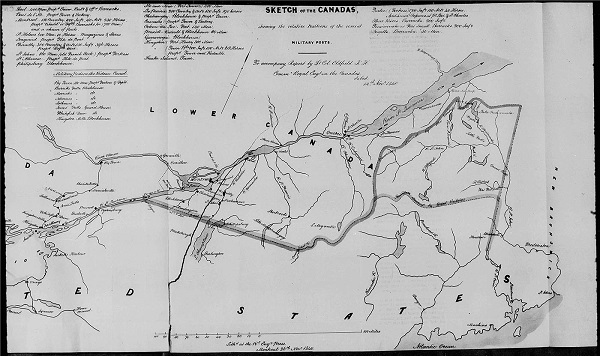
Beginning in the 1820s, the Confidential Print series was a selection of key correspondence, orders, policy documents, treaty texts, and memoranda from Great Britain’s Foreign Office and Colonial Office distributed internally to the Monarchy, Cabinet, members of Parliament, and within their organizations. Confidential Print: North America sheds light on controversies surrounding slavery, the treatment of Canadian indigenous peoples, uprisings against colonial rule, labor unrest in the United states, Nazi and fascist activities in Latin America, and much more. The record groups included in this series of Confidential Print are:
CO 880 War and Colonial Department and Colonial Office: Confidential Print North America, 1939-1914
CO 884 War and Colonial Department and Colonial Office: West Indies, Confidential Print 1826-1961
FO 414 Foreign Office: Confidential Print North America, 1824-1941
FO 461 Foreign Office: Confidential Print America, 1942-1956
FO 462 Foreign Office: Confidential Print United States of America, 1947-1956
More details about the contents of these record groups can be found in the Nature & Scope page of the site.
Primary Sources: American Civil Liberties Union Papers, 1912-1990
 The UC Berkeley Law Library’s acquisition of the online resource Making of Modern Law: American Civil Liberties Union Papers, 1912-1990 provides campus-wide access to an important collection of papers focusing on civil rights, civil liberties, race, gender, and issues relating to the U.S. Supreme Court.
The UC Berkeley Law Library’s acquisition of the online resource Making of Modern Law: American Civil Liberties Union Papers, 1912-1990 provides campus-wide access to an important collection of papers focusing on civil rights, civil liberties, race, gender, and issues relating to the U.S. Supreme Court.
Primary Sources: Women at Work during World War II: Rosie the Riveter and the Women’s Army Corps
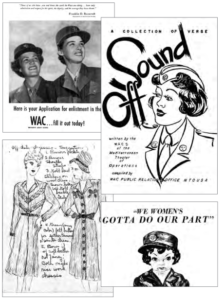 A new Library acquisition is Women at Work during World War II: Rosie the Riveter and the Women’s Army Corps. This module contains two major sets of records documenting the experience of American women during World War II: Records of the Women’s Bureau of the U.S. Department of Labor, and Correspondence of the Director of the Women’s Army Corps. Primary sources document a wide range of issues pertinent to women during this time of turbulent change, including studies on the treatment of women by unions in several midwestern industrial centers, and the influx of women to industrial centers during the war. Topics covered in records and correspondence include women’s work in war industries, pivotal issues like equal pay, childcare and race, and extensive documentation on the women who joined and served in the Women’s Army Corps as WACs.
A new Library acquisition is Women at Work during World War II: Rosie the Riveter and the Women’s Army Corps. This module contains two major sets of records documenting the experience of American women during World War II: Records of the Women’s Bureau of the U.S. Department of Labor, and Correspondence of the Director of the Women’s Army Corps. Primary sources document a wide range of issues pertinent to women during this time of turbulent change, including studies on the treatment of women by unions in several midwestern industrial centers, and the influx of women to industrial centers during the war. Topics covered in records and correspondence include women’s work in war industries, pivotal issues like equal pay, childcare and race, and extensive documentation on the women who joined and served in the Women’s Army Corps as WACs.
Primary Sources: FBI Confidential Files and Radical Politics in the U.S., 1945-1972
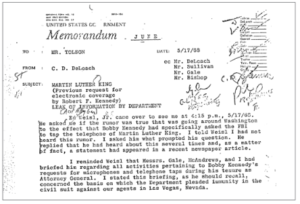 Another recent acquisition of the Library is the ProQuest History Vault module, FBI Confidential Files and Radical Politics in the U.S., 1945-1972. Under the leadership of J. Edgar Hoover, the FBI vigorously investigated and tracked the activities of Communist groups, Communist-front groups, and other radical organizations in the U.S. This module consists of records of the FBI and the Subversive Activities Control Board from 1945-1972.
Another recent acquisition of the Library is the ProQuest History Vault module, FBI Confidential Files and Radical Politics in the U.S., 1945-1972. Under the leadership of J. Edgar Hoover, the FBI vigorously investigated and tracked the activities of Communist groups, Communist-front groups, and other radical organizations in the U.S. This module consists of records of the FBI and the Subversive Activities Control Board from 1945-1972.
Highlights of this module include J. Edgar Hoover’s office files; documentation on the FBI’s so-called “black bag jobs,” as they were called before being renamed “surreptitious entries”; and the “Do Not File” File. The “Do Not File” file consists of records that were originally supposed to be destroyed on FBI Director J. Edgar Hoover’s order, however, through both intended and inadvertent exceptions to this order, large portions of these files survived. Another key collection in this module consists of the records of the Subversive Activities Control Board (SACB). The SACB files constitute one of the most valuable resources for the study of left-wing radicalism during the 1950s and 1960s.
Primary Sources: Southern Life and African American History, 1775-1915, Plantation Records, Part 2
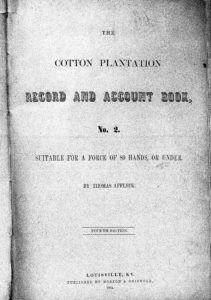 The Library has recently acquired the second set of Plantation Records in ProQuest History Vault. The records presented in this module come from the University of Virginia and Duke University. Major collections from the holdings of the University of Virginia include the Tayloe Family Papers, Ambler Family Papers, Cocke Family Papers, Gilliam Family Papers, Barbour Family Papers, and Randolph Family Papers. Major collections from the Duke University holdings document plantation life in the Alabama, as well as South Carolina, Georgia, North Carolina, Virginia, and Maryland.
The Library has recently acquired the second set of Plantation Records in ProQuest History Vault. The records presented in this module come from the University of Virginia and Duke University. Major collections from the holdings of the University of Virginia include the Tayloe Family Papers, Ambler Family Papers, Cocke Family Papers, Gilliam Family Papers, Barbour Family Papers, and Randolph Family Papers. Major collections from the Duke University holdings document plantation life in the Alabama, as well as South Carolina, Georgia, North Carolina, Virginia, and Maryland.
Event: Bancroft Library Roundtable: “The Ingenuity of Lillian Gilbreth”
The next Bancroft Library Roundtable will take place in the Lewis-Latimer Room of The Faculty Club at noon on Thursday, November 17. Ferd Leimkuhler, professor emeritus, Purdue University, will present “The Ingenuity of Lillian Gilbreth.”
In 2004 the U. S. Academy of Engineering published its vision of engineering in the new century and concluded that the engineer of 2020 will aspire to have the ingenuity of Lillian Gilbreth, the problem-solving capabilities of Gordon Moore, the scientific insight of Albert Einstein, the creativity of Pablo Picasso, the determination of the Wright brothers, the leadership capabilities of Bill Gates, the conscience of Eleanor Roosevelt, and the vision of Martin Luther King, Jr. The leading person in this distinguished list is UC Berkeley alumna Lillian Moller Gilbreth (Bachelor of Letters, 1900; Master of Letters, 1902; honorary doctorate, 1933, and Outstanding Alumna, 1954). This talk will discuss her ingenuity and the need to remember her bravery in a man’s world.
We hope to see you there.
José Adrián Barragán-Álvarez and Kathi Neal
Bancroft Library Staff
The Library attempts to offer programs in accessible, barrier-free settings. If you require disability-related accommodations, please contact The Bancroft Library at (510) 642-3781 — ideally at least two weeks prior to the event.
Library presentation on Federal Documents on LGBT History – November 15
Please join us for a presentation titled “We’re Here, We’re Queer, and We’re in the Public Record: Federal Documents on LGBT History” by Jesse Silva, Librarian for Federal and State Government Information.
Tuesday, November 15
12 noon – 1:00pm
303 Doe Library
The United States government provides a wealth of primary sources that can be used to document our nation’s stance on many social movements. In this session Jesse will focus on selected documents pertaining to the LGBT movement. Beginning in the 1800’s, we can see instances of sodomy and crimes against nature. By the 1950 and 60’s we see witch hunts and hushed silence stemming from a fear of national security, along with glimmers of hope. From the 1970’s forward we begin to see evidence of a more tolerant government together with a variety of backlashes until we arrive at the present day of marriage equality and the White House lit up in rainbow colors for Pride. While our society may not be fully inclusive of LGBT people, our government is much more open than it was in the past.
Jesse Silva, MLIS, is the Librarian for Federal and State Government Information, Political Science, Public Policy and Legal Studies. He has chaired the Education and Legislation committees of the American Library Association’s Government Documents Round Table and has written several articles and book chapters on government information librarianship. Jesse has worked as a librarian at UC Berkeley, University of North Texas and UC Santa Cruz.
303 Doe is in the northwest corner of Doe Library. Take the stairs or elevators that lead to the Art History/Classics Library.
This is a brown bag so bring your own lunch. Cookies will be provided.
Trial: Southern Life and African American History, 1775-1915, Plantation Records, Part 2
The Library has a trial of Southern Life and African American History, 1775-1915, Plantation Records, Part 2 that will run until November 20.
You can find a more detailed description of this collection at http://hv.proquest.com/historyvault/hv.jsp?pageid=browse&mid=14243#14243.
Access to Part 1 of the Plantation Records was acquired by the Library a few years ago.
Please send your feedback to dorner@berkeley.edu.
Trial: Primary source collection – Frontier Life
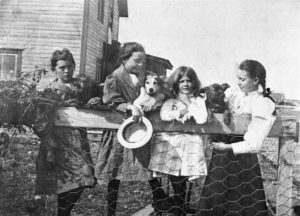 The California Digital Library has set up a system-wide trial of the online primary source collection Frontier Life, from Adam Matthew.
The California Digital Library has set up a system-wide trial of the online primary source collection Frontier Life, from Adam Matthew.
Frontier Life brings together first hand documents and experiences of frontier settlers across the globe. This multi-archive collection captures the lives, experiences and colonial encounters of people living at the edges of the Anglophone world from 1650-1920. It ranges across the various colonial frontiers of North America before touching on the settlers of Southern Africa, Australia and New Zealand. You can review more details about document types and source archives here.
The resource will be available until December 15, 2016. Please send your feedback to dorner@berkeley.edu.
Please note that PDF download options are not available during trials.
Manuscripts of Slavery Collection from the XULA Library Archives & Special Collections
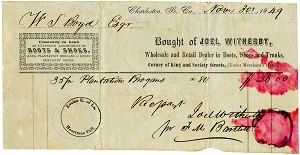 The Xavier University of Louisiana Library Archives and Special Collections is in the process of digitizing and making accessible the Charles F. Heartman Manuscripts of Slavery Collection, which includes materials dating from 1724 to 1897 relating to the social, economic, civil, and legal status of slaves and free people of color in Louisiana. Currently there are over 2,100 viewable items on the website, consisting of over 8,000 manuscript pages.
The Xavier University of Louisiana Library Archives and Special Collections is in the process of digitizing and making accessible the Charles F. Heartman Manuscripts of Slavery Collection, which includes materials dating from 1724 to 1897 relating to the social, economic, civil, and legal status of slaves and free people of color in Louisiana. Currently there are over 2,100 viewable items on the website, consisting of over 8,000 manuscript pages.
According to the collection guide, “approximately half of the Charles F. Heartman collection consists of municipal records from city of New Orleans. Clerical books, especially those of the Third Municipality, provide valuable information on the labor and leisure activities of slaves in the early nineteenth century. The city also had the largest concentration of Free People of Color in the nation, and encompassing tax records and business bonds reflect their economic activity. There are also rosters of Negro soldiers in the U.S. Army during the Civil War, and records of societies of Freemen dating from Reconstruction and beyond.” The collection includes records in French, English, and Spanish.